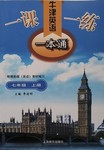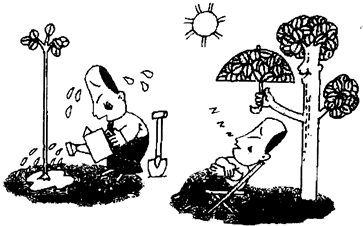题目内容
6.One hot night last July,when our new baby wouldn't or couldn't sleep,I tried everything I could think of:a warm bottle,songs,gentle rocking.Nothing would settle him.Guessing that I had a long night ahead of me,I brought a portable(手提式的) TV into his room,figuring that watching the late movie was as good a way as any to kill off the hours until dawn.To my surprise,as soon as the TV lit up,the baby quieted right down,his little eyes focused (集中) brightly on the tube.Not to waste an opportunity for sleep,I then tiptoes(踮脚尖) out of the room,leaving him to watch the actors celebrate John Bellushi's forty-fifth birthday.My wife and I heard none of the baby that night,and the next morning when I went into his room,I found him still watching TV himself.
I found in my baby's behavior a metaphor(暗语) for the new generation.My wife and I had given him some books to examine,but he merely spit upon(不屑一顾) them.When we read to him,he did not feel comfortable.And so it is in the schools.We find that our students don't read and they look down upon reading and scold those of us who teach it.All they want to do is watch TV.After this experience with the baby,however,I have reached a conclusion:"Let them watch it!"If television is that much more attractive to children than books,why should we fight it?Let them watch it all they want!
29.Why did the author bring a TV set into his son's room?B
A.To make his son stop crying.
B.To spend the night by watching TV programs.
C.To leave it to his son.
D.To make his son go to sleep as soon as possible.
30.The baby's reaction to the TV program wasA.
A.unexpected
B.exciting
C.awful
D.calm
31.According to the passage,which is true of the school children?C
A.They prefer reading to watching TV.
B.They like watching TV only after school.
C.They would rather watch TV than read books.
D.They like their teachers who teach them reading.
32.What do you think is the author's attitude towards TV expressed in the last two sentences?A
A.Favorable.
B.Serious.
C.Not favorable.
D.Not serious.
分析 本文中作者通过电视来安抚孩子的经历从而发现作者的孩子和学生们都不喜欢看书,而都喜欢看电视,对此作者认为如果电视能比书本更吸引孩子的话,那么就让孩子去看他们愿意看到吧.
解答 BACA
29.B;判断推理题,从文中第一段中"I brought a portable TV into his room,figuring that watching the late movie was as good a way as any to kill of the hours till dawn."可知作者是为了消磨时间.因此选B.
230.A;细节理解题,从文中第一段中"To my surprise,as soon as the TV lit up,the baby quieted right down,his little eyes focused brightly on the tube."可知作者感到很吃惊,出乎意料.因此选A.
3431.C;细节理解题,根据文章最后一段our students don't read and they look down upon reading and scold those of us who teach it.All they want to do is watch TV,作者的孩子和学生们都不喜欢看书,而都喜欢看电视.故答案选C.
32.A;判断推理题,根据I have reached a conclusion:"Let them watch it!"If television is that much more attractive to children than books,why should we fight it?Let them watch it all they want!可知作者对孩子看电视持赞同的态度,故答案选A.
点评 本文属于科教类的阅读,做本题时,首先通过浏览全文,把握文章大意,提炼出它们的中心思想,减少找读的时间.然后仔细查找文中细节,能根据文章内容进行合理推断.

 课时掌控随堂练习系列答案
课时掌控随堂练习系列答案 一课一练一本通系列答案
一课一练一本通系列答案 浙江之星学业水平测试系列答案
浙江之星学业水平测试系列答案As the train made its way through farmland,we relaxed in the knowledge that the journey would be a(27)Done.But after one hour,and the airport nowhere in sight,we started to (28)CRealising we were on the wrong train and close to tears,I wanted to get out at the next country station.At that point,a kind-hearted German lady,who had(29)Aour terrible situation,told us to remain on the train(30)Bwe reached the town of Landshut,which was about 40km from the airport.When we arrived,we got off the train.(31)Dthat we had no much money left,she guided us to an ATM.Af ter that she helped us find the stationmaster.After knowing what had happened to us,the stationmaster told us that a bus to the(32)B was leaving in six minutes and we were just(33)Btime to catch it.With John and me carrying our baggage,the three of us ran to the bus stop where she helped locate the (34)Cbus.
We(35)C reache d the airport 30 minutes before the plane took off.Aboard the plane,we (36)Ddown in our seats and then explained our near (37)Ato the passenger sitting next to us,who smiled and said she also came from Landshut.
We were in such a state that we didn't ask the name of the kind lady we had met on the train.After we arrived home,we wrote to Landshut's local newspaper to express our(38)Bto the unknown lady,without whom we might have got in big trouble on that day.
| 25.A.sent | B.bought | C.packed | D.left |
| 26.A.followed | B.made | C.used | D.showed |
| 27.A.single | B.hopeful | C.safe | D.short |
| 28.A.sigh | B.weep | C.panic | D.debate |
| 29.A.noticed | B.faced | C.changed | D.accepted |
| 30.A.when | B.until | C.after | D.since |
| 31.A.Admitting | B.Explaining | C.Expecting | D.Learning |
| 32.A.stage | B.airport | C.station | D.country |
| 33.A.at | B.in | C.beyond | D.behind |
| 34.A.empty | B.new | C.correct | D.last |
| 35.A.truly | B.exactly | C.finally | D.totally |
| 36.A.looked | B.went | C.bent | D.settled |
| 37.A.disaster | B.damage | C.discovery | D.holiday |
| 38.A.ideas | B.thanks | C.wishes | D.supports. |
1.Listen first.
One of the best English speaking tips is to listen carefully to understandable English EVERY DAY.Most people turn to textbooks to study English grammar rules,but you cannot learn the correct English pronunciation of the words merely by reading them.You do not need to learn grammar in detail because this can prevent you from speaking English fluently.
Instead,listen to how native English speakers pronounce and observe their mouth movements.Also watch English shows and movies to build on your English accent and improve your vocabulary.
2.Practice makes perfect.
Studies show that you'll probably spend three months of practice every day in order to have strong mouth muscles.Read aloud in English for 15to 20minutes a day in front of the mirror,which helps in accent reduction and improves your English communication skills.
Also,practice with your friends and family.Talking with a good English speaker can help improvise (即兴发挥) your usage of words and formation of sentences.
3.Think in English.
One of the most effective English speaking tips is to think in English.What most English learners do in the early stages of learning is that they think of what they have to say in their native language,translate and then say it in English.This can be mentally tiring.
If your goal is to speak English fluently,you need to learn"thinking"in English.Make up the sentences in English as you think about them before saying them.With practice,you will be able to respond automatically in English.
4.Be more confident.
All these English speaking tips will be in vain if you are not that confident in your English speaking skills.It is quite natural to commit errors when learning a new language.
Try to relax if you're speaking in English.When you speak at a normal speed,you'll discover that you will be able to pronounce the words correctly and people will understand you.Most of the time,the person you are talking to is not even aware of your errors.
In a word,learning English does not happen overnight.It takes a lot of time,effort and practice.Don't get too frustrated and never give up.Follow these English speaking tips and practice daily.Soon,you would learn to speak English fluently as if it is your own language.
English speaking tips you must know
| Introduction | It's many people's dream to (90)avoidthe discomfort from being unable to speak English in a new place. |
| Tips | Listen first. v Seeking help from textbooks won't enable you to learn the (91)correctEnglish pronunciation. v Listen to how native English speakers pronounce and observe how their mouths (92)move. v Watch English shows and movies to improve your English accent and (93)vocabulary. |
| Practice makes perfect. v Practice three months to (94)strengthenyour mouth muscles. v Regular reading (95)aloudcan reduce accent and improve your English communication skills. v Practice with your friends and family. | |
| Think in English. v Thinking in your native language makes you (96)tiredmentally. v Thinking in English will reward you with automatic (97)response/reactionin English. | |
| Be more confident. v Committing errors is a necessary part of language learning. v Try to relax to speak at a normal speed and make yourself(98)understood. | |
| (99)Conclusion | Learning English does not happen overnight. |
| A. | ordinary | B. | major | C. | world | D. | report |
 请仔细观察下面两幅图画,理解其含义,然后就"人与自然"这一话题写一篇英语短文.注意:
请仔细观察下面两幅图画,理解其含义,然后就"人与自然"这一话题写一篇英语短文.注意: